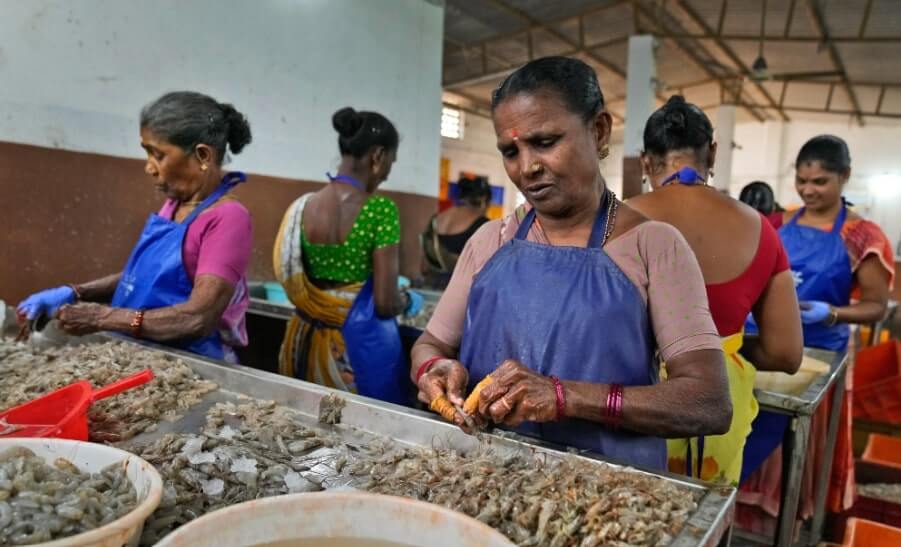India has vehemently rejected allegations by a Chicago-based human rights group that the Indian shrimp industry engages in human rights abuses and environmental destruction to meet demands for ever-lower prices. The report titled “Hidden Harvest: Human Rights and Environmental Abuses in India’s Shrimp Industry” was released by the Corporate Accountability Lab (CAL).
Allegations of Violation
The CAL report mentions that India has emerged as the US’ leading source of shrimp, the North American country’s most consumed seafood, in the past decade. India overtook Thailand to become the largest exporter of shrimp, reaching 40% of the total shrimp imports in the US in 2023.
The four-page report was curated following a multi-year investigation that exposed systemic abuses throughout the Indian shrimp supply chain. It outlines that the country’s shrimp production process relies on “forced labour, dangerous and abusive working conditions, and environmental destruction.”
Shrimp, the leading seafood in the United States, is largely supplied by India, but the industry struggles with labor and environmental problems.
— The Associated Press (@AP) April 1, 2024
The Associated Press traveled to southeast India to document working conditions in the booming industry. pic.twitter.com/hBBstoidOW
It further notes that the industry exploits vulnerable lower caste (Dalit, Adivasi, and fisher communities) and migrant populations to work under dangerous conditions and constrains their movements through guarded company housing. Several workers in the field lack contracts with their employers, leading to increased job insecurity.
Moreover, the working conditions for the employees are exploitative, with the workers experiencing verbal abuse and women experiencing gender discrimination and harassment. Debt bondage and employment of young teenage girls are among other issues noted in the report.
Additionally, it mentions that shrimp production in India is causing severe environmental damage, leading to the destruction of other industries, like agriculture and fishing, near production facilities. Further, the destruction of mangrove and wetland habitats and the pollution of community water supplies are some other environmental issues being exacerbated.
CAL’s concerns were also shared by the Associated Press, which claimed in a report that it had verified the CAL report in its investigation in Andhra Pradesh and found instances of abuse. Additionally, a report by NBC News in collaboration with The Outlaw Ocean Project noted the violations, along with reporting that Indian companies are selling contaminated shrimp to US grocery stores.
Call for Action
CAL alleges that the Indian government has failed to effectively address labour, health and safety, environmental, and several international conventions violations. It highlighted that the government has left the shrimp industry to self-monitor, further suggesting that certification schemes that aim to ensure law compliance are just “marketing ploys that fail to protect the workers or the environment.”
It calls upon the US buyers to “work with Indian production companies to improve working conditions and clean up the environmental harms” linked to the industry. While urging Inda to enforce existing laws, it said that the US government must regulate shrimp imports to ensure all legal requirements are met.
The report underscores that “the conditions found in the Indian shrimp sector are not inevitable but instead result from cost-cutting and downward pricing pressure by the US.” “It is time to prioritise the well-being and dignity of workers and the environment over profit-making from America’s favourite seafood,” it added.
India Rejects Report
The Hindu reported that top Commerce Ministry officials in India will meet seafood exporters on Thursday to discuss attempts to tarnish the industry’s global reputation. A senior official termed the CAL report as “baseless” and said that India was aiming to increase its seafood exports to Rs 1 lakh crores (~$12 billion) in the next two years.
He alleged that the report was driven by vested interests and aimed to malign the reputation of the Indian aquaculture sector and its products in the global market. The official added that, as the Indian shrimp exports were certified by the Marine Products Export Development Authority (MPEDA), there was no scope for such concerns about overseas shipments.
An MPEDA official also rejected the report, saying that it “highlights isolated instances without verifying their authenticity.” He underlined that India’s shrimp value chain is fully compliant with international regulations and is audited by inspectors of the European Commission, the US Food and Drug Administration (USFDA) and the GAC of China.

